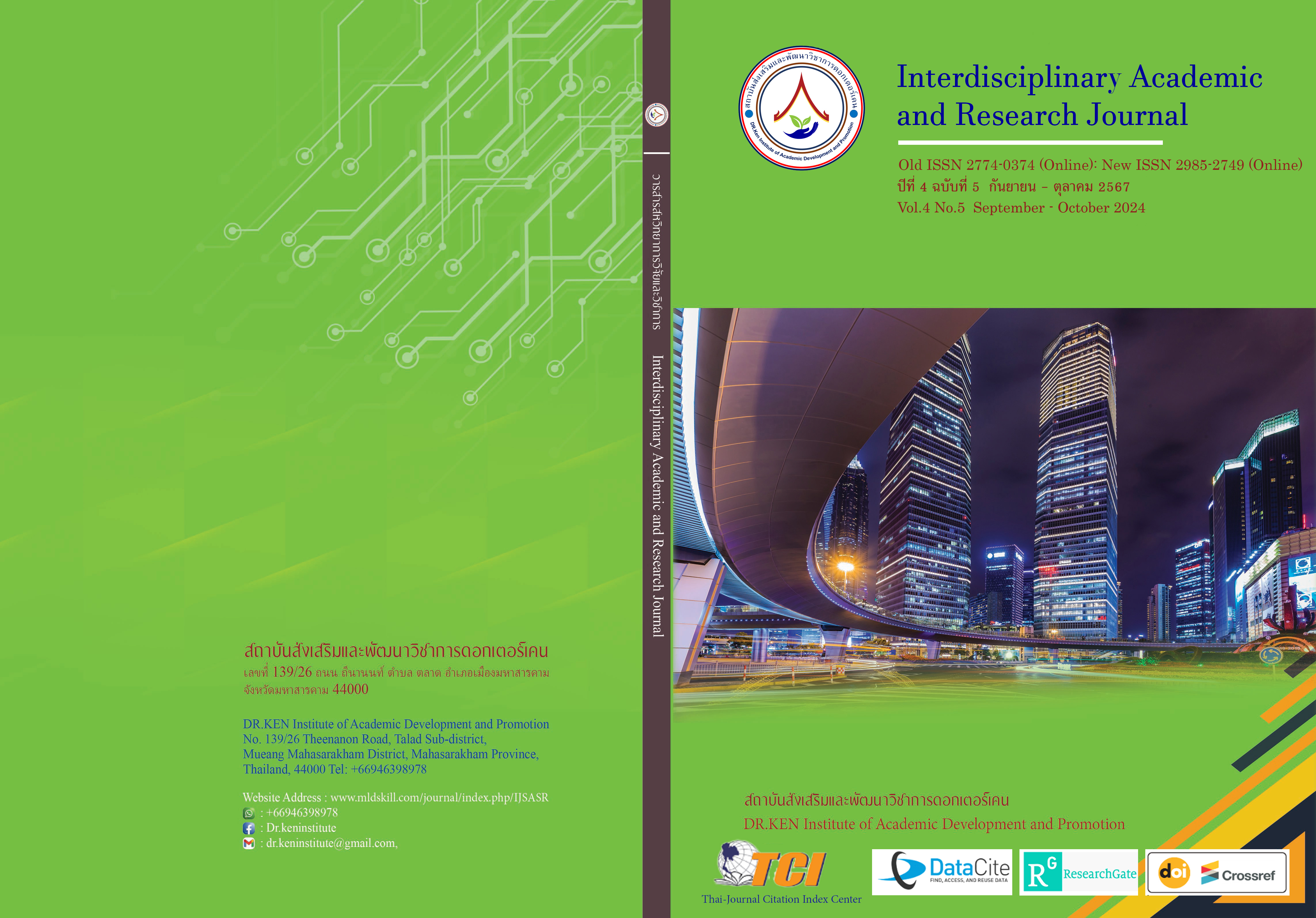The Development of Training Curriculum for English Major Students to Enhance Organizational Skills in English Extracurricular Activities at Rajabhat Maha Sarakham
DOI:
https://doi.org/10.60027/iarj.2024.276895Keywords:
Development of Training Curriculum;, Extracurricular ActivitiesAbstract
Background and Aims: In organizing activities to supplement the English curriculum teachers must have an understanding of teaching language and culture simultaneously. To promote the culture of native speakers and lead to good understanding, teachers therefore need to create understanding and prepare youth for the modern world society. To be consistent with the basic education core curriculum, the researcher therefore sees a solution to the problem with extra-curricular activities that are very important and necessary today. The objectives of this research are to (1) study basic information and needs for developing a training curriculum, (2) develop a training curriculum, (3) implement the training curriculum, and (4) evaluate the training curriculum.
Methodology: The research is divided into 4 phases: Phase 1 studies basic information and training needs; Phase 2 develops the curriculum; Phase 3 implements the curriculum; and Phase 4 evaluates the curriculum. The sample group in Phase 1 included 108 student teachers and a focus group of 11 experts and teaching staff, selected purposively. The target group in Phase 2 consisted of 7 expert informants who are used in the seminar based on connoisseurship. Phase 3 was a target group of 30 people, and Phase 4 included 37 training participants and experts. The tools used for data collection were questionnaires, curriculum coherence and appropriateness assessment forms, activity evaluation forms, and tests. The statistics used for data research were mean, standard deviation, and percentage.
Results: The research results found that (1) The current situation of the problem regarding the ability of student teachers to organize extra-curricular activities had an issue rate of 83%, with a training need of 91%. Expert and instructor group discussions agreed that student teachers should be developed in organizing English language extracurricular activities, including academic, linguistic, and cultural aspects, as well as measurement and evaluation. (2) The development of the training curriculum found that it comprises seven elements: (2.1) The background and significance of the problem, (2.2) The principles of the curriculum, (2.3) The objectives of the curriculum, (2.4) The content of the curriculum, (2.5) Training activities, (2.6) Media and equipment, and (2.7) Measurement and evaluation. The overall curriculum appropriateness and coherence assessment results were at a high level, which is higher than the specified criteria of 3.5 or above, indicating that the training curriculum is of high quality and can be further developed. (3) Implementing the training curriculum showed that the scores for organizing activities during and testing after the training were above the 80% standard by 100%, and satisfaction with the training curriculum was high. (4) The evaluation of the training curriculum, informed by feedback from 37 participants including both course users and experts, was at the highest level, demonstrating that the overall efficiency of the curriculum is at the highest level.
Conclusion: The study indicated a clear need for enhancing student teachers' ability to plan extracurricular activities, with an 83% issue rate and a 91% training need. The participants' skills were effectively improved by the designed training program, which was deemed to be very appropriate and cohesive, as evidenced by their high levels of satisfaction and scores that exceeded the 80% threshold.
References
กระทรวงศึกษาธิการ. (2551). หลักสูตรแกนกลางการศึกษาขั้นพื้นฐานพุทธศักราช 2551. กรุงเทพฯ: กระทรงศึกษาธิการ.
ธำรง บัวศรี. (2532). ทฤษฎีหลกัสูตรการออกแบบและพัฒนา. กรุงเทพฯ: คุรุสภาลาดพร้าว.
นรเศรษฐ์ พิสิฐพันพร. (2557). โลกทัศน์ของชาวเขมร. ใน เสาวภา พรสิริพงษ์, เรียนรู้ประเทศเพื่อนบ้าน:กัมพูชาในมิติทางสังคมวัฒนธรรม (หน้า 15-55). นครปฐม: สถาบันวิจัยภาษาและวัฒนธรรมเอเชีย มหาวิทยาลัยมหิดล.
นิตยา เปลื้องนุช (2554). การบริหารหลักสูตร. ขอนแก่น: มหาวิทยาลัยขอนแก่น.
นิภา นิธยายน. (2529). การปรับตัวและบุคลิกภาพ. กรุงเทพฯ: สารศึกษาการพิมพ์.
ปัทมาภรณ์ ธรรมทัต, (2542). กระบวนการให้สารนิเทศเพื่อการปรับตัวทางวัฒนธรรมของบุคลากรต่างชาติในประเทศไทย. วิทยานิพนธ์ปริญญาศิลปศาสตรมหาบัณฑิต: มหาวิทยาลัยรามคำแหง.
พัฒนา สุขประเสริฐ. (2543). กลยุทธ์ในการฝึกอบรม. กรุงเทพฯ: มหาวิทยาลัยเกษตรศาสตร์.
วิชัย วงษ์ใหญ่, 2532(2532). กระบวนการพัฒนาหลักสูตรและการเรียนการสอน : ภาคปฏิบัติ.กรุงเทพฯ : สุวีริยาสาสน์.
สงัด อุทรานันท์. (2532). เทคนิคการจัดการเรียนการสอนอย่างเป็นระบบ (พิมพ์ครั้งที่ 6). กรุงเทพฯ: มิตรสยาม.
สุมิตร คุณานุกร. (2533). หลักสูตรและการสอน. พิมพ์ครั้งที่ 4. กรุงเทพฯ: ศึกษิตสยาม.
สุรางค์ โค้วตระกูล. (2541). จิตวิทยาการศึกษา. กรุงเทพฯ: โรงพิมพ์แห่งจุฬาลงกรณ์มหาวิทยาลัย.
เสาวนีย์ จิตต์หมวด, (2554). การถ่ายทอดวัฒนธรรมอิสลามของครอบครัวชาวไทยมุสลิม ในกรุงเทพมหานคร. รายงานการวิจัย. กรุงเทพฯ: สถาบันราชภัฏธนบุรี.
Banks, J.A. and McGee, C.A. (1989). Multicultural Education. Allyn & Bacon, Boston.
Brettel & Sargent, (2009). Gender in Cross-Cultural Perspective 5th Edition. Pearson College Div.
Krejcie, R.V., & Morgan, D.W. (1970). Determining sample size for research activities. Educational and Psychological Measurement, 30(3), 607–610.
Maruca, P. M. (2002). Impact of parent involvement on Hispanic, limited English proficient students and their parents. Doctoral dissertation, Flagstaff: Northern Arizona University.
Oliva: F. (1992). Developing the Curriculum. Boston: Brown and Company.
Ramirez-Verdugo, D., & Belmonte, I. A. (2007). Using digital stories to improve listening comprehension with Spanish young learners of English. Language Learning & Technology, 11 (1), 87-101.
Saylor, J.G., & Alexander, M.W. (1974). Planning Curriculum for School. 3rd ed. New York: Holt Rinehart and Winston.
Soler, E.A., & Jordà, M.P. (2007). Intercultural Language Use and Language Learning. Springer. DOI:10.1007/978-1-4020-5639-0
Stufflebeam, D.L. (1971). The Relevance of the CIPP Evaluation Model for Educational Accountability. Journal of Research and Development in Education, 5, 19-25.
Taba, H. (1962). Curriculum Development: Theory and Practice. New York: Harcourt, Brace and World.
Downloads
Published
How to Cite
Issue
Section
License
Copyright (c) 2024 Interdisciplinary Academic and Research Journal

This work is licensed under a Creative Commons Attribution-NonCommercial-NoDerivatives 4.0 International License.
Copyright on any article in the Interdisciplinary Academic and Research Journal is retained by the author(s) under the under the Creative Commons Attribution-NonCommercial-NoDerivatives 4.0 International License. Permission to use text, content, images, etc. of publication. Any user to read, download, copy, distribute, print, search, or link to the full texts of articles, crawl them for indexing, pass them as data to software, or use them for any other lawful purpose. But do not use it for commercial use or with the intent to benefit any business.
















.png)


